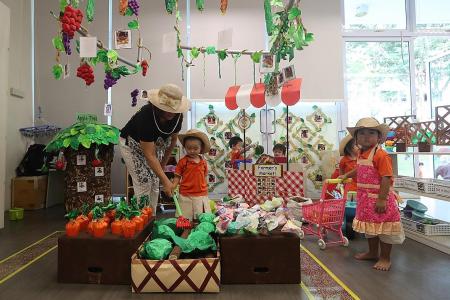Study to track well-being, learning of kids from lower-income families
NTUC First Campus and NIE aim to find out how support schemes help children from low-income families
NTUC First Campus, the second largest pre-school operator in Singapore after the PAP Community Foundation, will be embarking on a study to determine how pre-schoolers from disadvantaged backgrounds and their families can be best helped.
The three-year study, which will kick off next year with NTUC First Campus working with the National Institute of Education (NIE), aims to understand how the operator's present support schemes have helped children from low-income families.
The study, a first here, will track the well-being and learning of up to 100 children, from the time they are in Kindergarten 1 to when they begin Primary 1 in 2021.
It will also evaluate how their families' circumstances have changed after receiving assistance.
The children will be from 10 My First Skool centres, which are also part of Kidstart, a scheme to give a leg-up to young children from disadvantaged families.
The study, announced by NTUC secretary-general Ng Chee Meng yesterday at a My First Skool pre-school in Yung An Road in Jurong, will involve two researchers from NTUC First Campus and six NIE researchers.
NTUC First Campus will provide up to $500,000 to fund the operating expenses for the study, which also hopes to address broader issues such as social mobility and inequality, and the role that pre-school education can play in uplifting families.
Since 2016, NTUC First Campus's support schemes have been grouped under its Child Support Model.
It provides families with social support, along with learning programmes and financial assistance. It has been implemented across all 140 My First Skool centres and has supported 15,000 children.
Next year, another 3,000 children will benefit from such support, through a combined sum of $7.3 million pumped in by NTUC First Campus and the Government.
Dr Heidi Layne, a research scientist from NIE's Office of Education Research who is the principal investigator for the study, said: "Ages five to seven are very important in the preparation for Primary 1, and we do know that children from low-income families face challenges and lag behind their peers when they reach primary school.
"We're trying to bridge the gap for these families."
Get The New Paper on your phone with the free TNP app. Download from the Apple App Store or Google Play Store now



